Beef Tenderloin with Red Wine Sauce
- By Jennifer Segal
- November 29, 2024
- 1,352 Comments
- Leave a Review

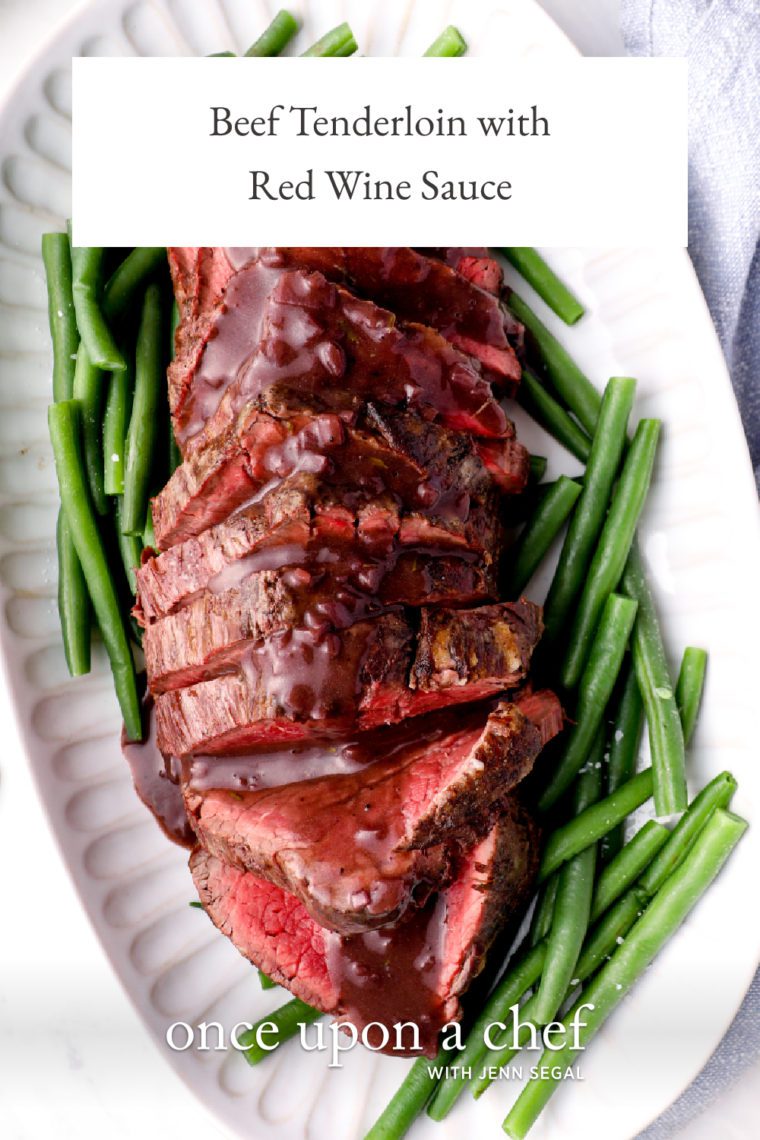
This post may contain affiliate links. Read my full disclosure policy.
This beef tenderloin looks fancy, but it couldn’t be easier to make. It cooks up perfectly every time, and the rich red wine sauce takes it over the top. A total showstopper for any special dinner.
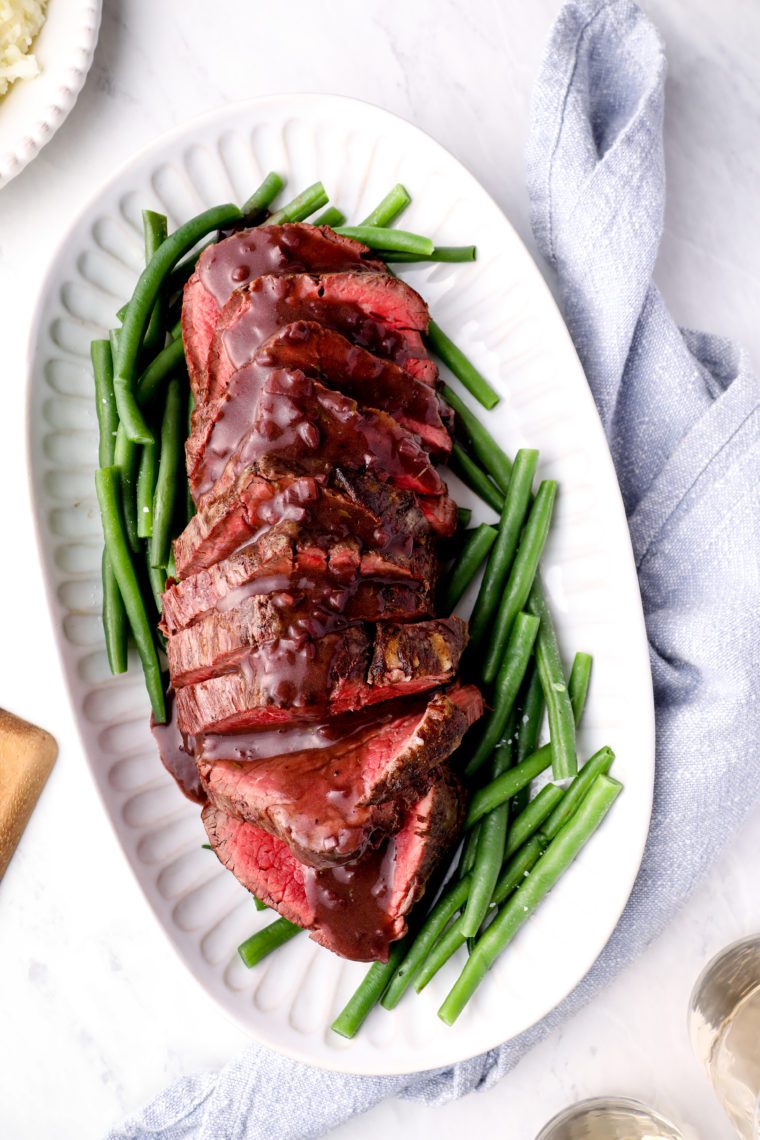
This beef tenderloin recipe is my #1 go-to for holidays and special occasions. It never fails to impress, and my foolproof method ensures perfectly cooked beef every time, with no guesswork! The tenderloin is paired with a red wine reduction sauce—made by simmering wine, broth, and aromatics until the flavors concentrate, then finished with butter for a silky, gorgeous sauce that rivals anything you’d order at a fine restaurant—yes, it’s fancy!
A great bonus is that the sauce can be prepared mostly in advance, so there’s very little fussing at the last minute. Similar to my pork tenderloin, this recipe is truly the best of both worlds: simple to prepare yet incredibly delicious.
“Voted best Christmas dinner ever!”
What You’ll Need To Make Beef Tenderloin with Red Wine Sauce
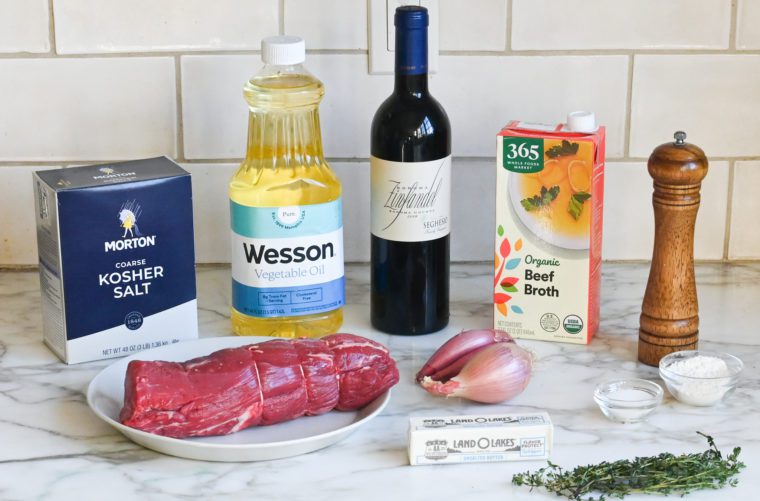
- Beef tenderloin: The most tender and expensive cut of beef, this is the whole piece before it’s sliced into steaks, which are known as filet mignon (great for recipes like steak au poivre or pan-seared steaks). As a general rule, plan for about ½ pound per person for a generous serving. Your tenderloin may be tied with butcher’s twine near the tapered end to keep it evenly thick; leave the string on until after it is cooked. If it’s not tied, no worries—no tying is necessary.
- Butter: A portion is used for sautéing shallots, while the rest is combined with flour to create a beurre manié, which thickens the sauce.
- Shallots: Adds a mild onion flavor to the sauce.
- Red wine: Adds rich, fruity flavors and depth of color to the sauce. Any variety, such as Merlot, Pinot Noir, Cabernet Sauvignon, Syrah, or Red Zinfandel, will work. When cooking with wine, choose an inexpensive bottle that’s still enjoyable to drink. Avoid supermarket “cooking wines,” which often contain salt and additives.
- Beef broth: Provides a savory base for the sauce; also used to deglaze the pan after roasting the beef.
- Thyme sprigs: Adds earthy, aromatic flavor to the sauce.
- All-purpose flour: Mixed with butter to create a beurre manié, a thickening agent for the sauce.
- Jump to the printable recipe for precise measurements
Step-by-Step Instructions
Make the Sauce: Melt the butter in a saucepan and cook the shallots over medium-low heat until soft. Add the wine, broth, thyme, salt, pepper, and sugar, then bring to a boil. Simmer for 30 minutes until reduced by half. In a small bowl, mix a few more tablespoons butter with flour to form a paste. Gradually whisk the paste into the sauce and simmer until thickened. The sauce can be made a few days ahead up to this point.

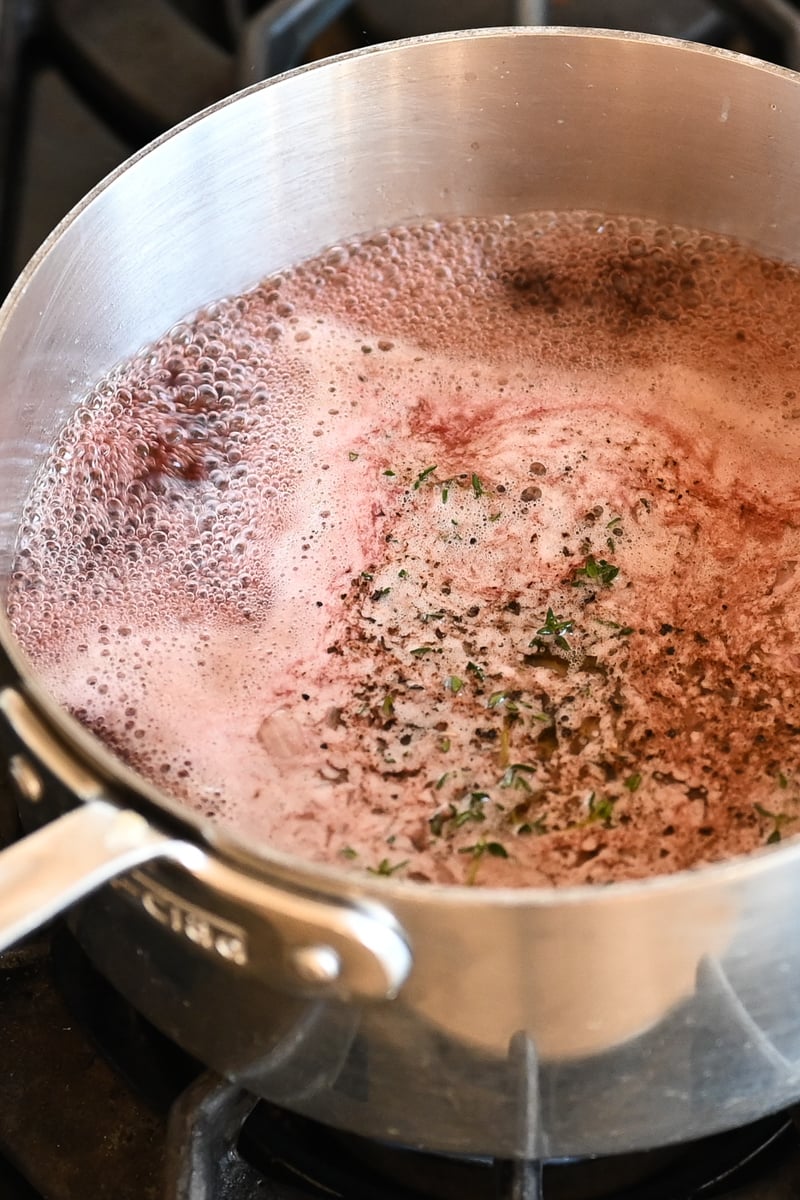


Sear & Roast the Beef Tenderloin: Season the beef with kosher salt and freshly ground black pepper. Don’t be shy with the seasoning; it needs a lot!

Heat the oil in an oven-proof skillet over medium-high heat until almost smoking. Cook until well browned with a nice crust on all but one side. Turn the tenderloin so that the un-seared side is down and transfer the skillet directly to a 400°F oven. I recommend using a leave-in meat thermometer with a remote monitor to keep an eye on the roast. These are ideal for cooking pricey cuts like tenderloin (they’re great for other dishes too, like turkey).

Roast until cooked to your liking, keeping in mind that the the internal temperature will continue to rise 5 to 10 degrees after being removed from the oven—this is known as carryover cooking.
Rare: 115°F-120°F
Medium Rare: 120°F-125°F
Medium: 130°F-135°F
Medium-Well: 140°F-145°F
Well Done: 150°F and above
Finish the Sauce and Carve the Beef: Set the pan on the stovetop, add the broth, and bring to a boil, deglazing by scraping up the brown bits with a wooden spoon. Add this flavorful broth to the wine sauce and bring it to a simmer.

Carve the roast into slices and serve, passing the red wine sauce at the table. The tenderloin is wonderful served over mashed potatoes with a simple vegetable, like French green beans or roasted Brussels sprouts.

You May Also Like
Beef Tenderloin with Red Wine Sauce
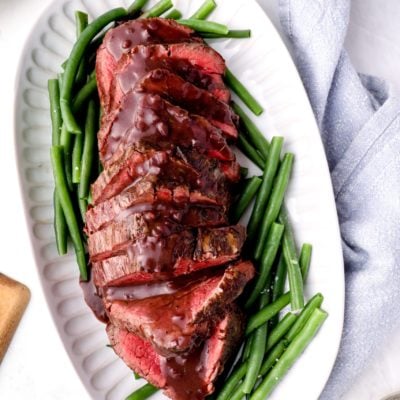
Ingredients
For the Sauce
- 8 tablespoons unsalted butter, divided
- ¾ cup finely chopped shallots, from 2 to 3 large shallots
- 1¼ cups red wine
- 3 cups beef broth
- 6 fresh thyme sprigs
- ¼ teaspoon kosher salt
- ⅛ teaspoon freshly ground black pepper
- 1 teaspoon sugar
- 2 tablespoons all-purpose flour
For the Beef
- 1 (2 to 3 lb) center-cut beef tenderloin roast
- Kosher salt (½ teaspoon per pound of beef)
- Freshly ground black pepper (¼ teaspoon per pound of beef)
- 2 tablespoons vegetable oil
- ¼ cup beef broth
Instructions
For the Sauce
- Melt 5 tablespoons of the butter in a medium saucepan. Add the shallots and cook over medium-low heat, stirring occasionally, until soft and translucent, 7 to 8 minutes. Add the wine, beef broth, thyme sprigs, salt, pepper and sugar, and bring to a boil. Cook over medium heat for about 30 minutes, or until the liquid is reduced by about half.
- While the liquid is reducing, place the remaining 3 tablespoons of butter in a small bowl and soften in the microwave, if necessary (it should be soft but not melted). Add the flour and, using a small spoon, mix into a smooth paste.
- Once the wine mixture is reduced, reduce the heat to low and remove the thyme sprigs. Whisk the flour-butter paste, a tablespoon at a time, into the simmering liquid, and simmer for a few minutes, until the sauce is thickened. Set aside. (The sauce can be made up to this point and refrigerated up to 3 days ahead of time.)
For the Tenderloin
- Let the beef stand at room temperature for 1 hour before roasting. Set an oven rack in the middle position and preheat the oven to 400°F (205°C).
- Season the beef all over with kosher salt and pepper. Heat the oil in an oven-proof skillet over medium-high heat until almost smoking. Cook, turning with tongs, until well browned on all but one side, about 10 minutes total. Turn the tenderloin so that the un-seared side is down, and transfer the skillet directly to the preheated oven. (If your pan isn't oven-proof, transfer the beef to a lightly oiled roasting pan.) Roast until a thermometer inserted into the center of the meat registers 120°F to 125° (49°C to 52°C) for medium rare, about 15 minutes, or until done to your liking (115°F to 120°F/46°C to 49°C for rare, 130°F to 135°F/54°C to 57°C for medium). Keep in mind that these temperatures account for the fact that the temperature will continue to rise about 5 degrees while the meat rests.
- Transfer the meat to a carving board (preferably with a well for collecting juices) and let it rest, covered loosely with aluminum foil, for 10 to 15 minutes. Place a dishtowel or oven mitt over the handle of the roasting pan to remind yourself that it's hot.
- Meanwhile, carefully discard the fat from the roasting pan (remember that the handle is hot!). Set the pan on the stovetop and add the ¼ cup (60 ml) of broth. Bring the broth to a boil and, using a wooden spoon, scrape the fond, or brown bits, from the bottom of the pan. Add the flavorful broth to the red wine sauce, and then bring the sauce to a simmer.
- Carve the tenderloin into ½-inch (13-mm) thick slices. Serve the beef, passing the red wine sauce at the table.
Pair with
Nutrition Information
This website is written and produced for informational purposes only. I am not a certified nutritionist and the nutritional data on this site has not been evaluated or approved by a nutritionist or the Food and Drug Administration. Nutritional information is offered as a courtesy and should not be construed as a guarantee. The data is calculated through an online nutritional calculator, Edamam.com. Although I do my best to provide accurate nutritional information, these figures should be considered estimates only. Varying factors such as product types or brands purchased, natural fluctuations in fresh produce, and the way ingredients are processed change the effective nutritional information in any given recipe. Furthermore, different online calculators provide different results depending on their own nutrition fact sources and algorithms. To obtain the most accurate nutritional information in a given recipe, you should calculate the nutritional information with the actual ingredients used in your recipe, using your preferred nutrition calculator.
See more recipes:
Comments
Add a Comment Cancel reply
This site uses Akismet to reduce spam. Learn how your comment data is processed.
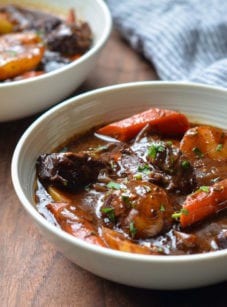
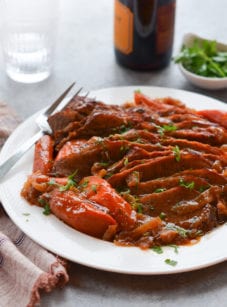


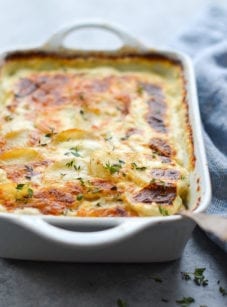
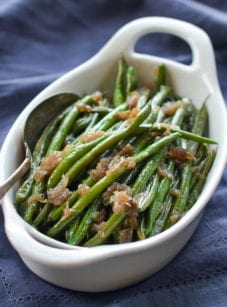

I am making this for Christmas Eve dinner. One of my guest is gluten intolerant. If I use corn starch instead of flour for the sauce will the flavor be impacted?
Hi Jo, Cornstarch will work, but I’d incorporate it a bit differently. I’d add all of the butter in the beginning, then instead of the beurre manie, make a cornstarch slurry with 2 tablespoons of cornstarch and 2 tablespoons of cold water. Add the slurry little by little at the end, whisking to combine and letting the sauce thicken with each addition, until the sauce is thickened to your liking. (You may not need all of it.) You can also use gluten-free flour. Hope everyone enjoys!
What kind of roasting pan do you recommend using? Looks like you used a cast iron one which I do not have. I have a Farberware roasting pan but don’t know if I can use it to sear the meat on my gas stove top before transferring it to the oven. I also have an All Clad roasting pan but it is probably much larger than I need for a filet of about 3 lbs. Suggestions?
Hi Lenore, if you have a stainless steel pan, that would work well, as it could go from the stove to the oven. If you don’t, and you just have a nonstick pan, I would sear all four sides of the tenderloin in the pan and then transfer it to your Farberware roasting pan. Hope that helps that you enjoy!
Hi Jenn,
What size cast iron skillet did you use for the 3lb tenderloin? Also, could I use my Le Creuset
Dutch oven to sear and then roast it instead? Looking forward to making this for Christmas and want to get it right. Have always had success with all of your recipes in the past! Thanks for your help.
I use a 12-inch skillet for this, but a Dutch oven would work too. 😊
Thank you for this amazing recipe. Question: If I roast the tenderloin in the oven with other dishes, ie., roasted onions, vegetable casserole, etc., will this impact the cooking process?
Hi Jenny, Yes it may slow down the cooking time a bit, but it’s hard to say exactly how much. I’d use a thermometer so you don’t have to guess.
Hi Jen, I’m planning on making this for Christmas Eve dinner. My question is about the wine sauce…I understand how it complements the beef, but can you put it over anything else? I’m thinking of making your “Make Ahead” mashed potatoes or the Smashed Red Potatoes to go along with, and I know that my hubs will want to spoon it over the potatoes like a gravy. Would that taste OK? I make the Au Gratin Potatoes often and made the Jammy Shallot Green Beans (which are to die for!) on Thanksgiving so I’m looking to try your roasted green beans and one of the potatoes mentioned. I know that EVERYTHING will turn out delicious because all of your recipes do! Thanks!
Hi Shelly, It should go beautifully with everything you’re planning to serve. I probably wouldn’t use it as generously over potatoes and such as I would gravy—it has a more intense flavor because of the wine reduction—but it will definitely complement everything on the plate. Hope that helps and happy holidays!
Hi Jenn, this looks great. I will have 7 adults for Christmas so plan to get a larger beef tenderloin. I assume the sauce should also be doubled? But 16 tablespoons of butter is so much! 😬
I know that sounds like a lot of butter, but the sauce should definitely be doubled – it makes the dish sing. Hope you enjoy!
Hi Jenn.
Is it possible to sear the tenderloin a day ahead, then refrigerate and roast the next day?
Hi Jan, I wouldn’t recommend it from a food safety standpoint — sorry!
Hi Jen,
Would you recommend open air “dry aging” the salted tenderloin in the refrigerator a few days before searing/roasting to enhance the beef flavor/tenderness?
I made this recipe last Christmas-the sauce is excellent (made ahead)!
Thanks – love your recipes!
-Shannon
Hi Shannon, I don’t think it’s necessary as tenderloin is already very tender, but a short dry aging in the fridge (a few hours or overnight) certainly might enhance the flavor. I’d love to know how it turns out if you try it.
Hi Jenn,
You are my culinary goddess! This beef tenderloin with red wine gravy recipe was so easy yet it was the best roast and gravy I have ever tasted. Thank you so much for all of your great recipes. You never disappoint !
Happy holidays to you and your family.
❣️
This recipe is for a smaller filet. I need a larger piece to feed more people. Can I brown the meat in skillet on stove but transfer to large pan in the oven? A skillet will not fit a larger piece of meat?
Sure!
I am planning a dinner for my husband and 6 of our good friends. Two can not have gluten. Is it possible to make the sauce with cornstarch instead of flour?
Hi June, Cornstarch will work, but I would go about incorporating it a bit differently. I would add all of the butter in the beginning, then instead of the beurre manie, I would make a cornstarch slurry with 2 tablespoons of cornstarch and 2 tablespoons of cold water. Add the slurry little by little at the end, whisking to combine and letting the sauce thicken with each addition, until the sauce is thickened to your liking. You may not need all of it. You could also use gluten-free flour. Hope everyone enjoys!
Thank you *so* much, Jenn, for answering my question as thoroughly as you did. (A woman after my own heart; I’m a retired copy editor who is often accused of being *too* detail oriented!) For sure I’ll let you know how it turns out with the cornstarch slurry. Happy Chanukah/Hanukkah to you and your family! :>)